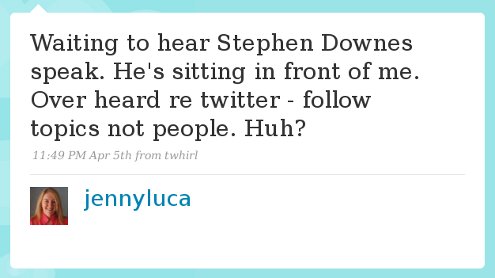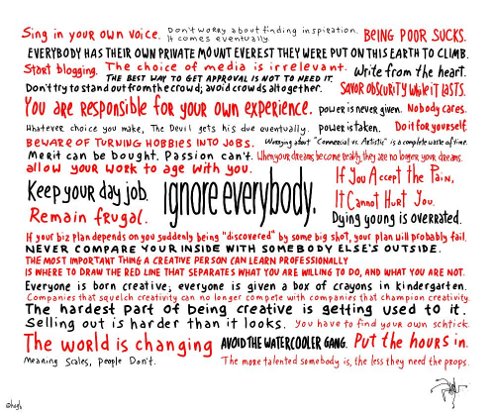Ignore everybody.
There are blog posts I plan in advance and there are those that happen as a result of serendipity and need blogging straight away. This is very much one of the latter. :-p
Earlier this week I was following with interest the tweets of Jenny Luca, an Australian educator, as she sat in the audience during one of Stephen Downes‘ presentations. Before the whole thing even started, she overheard Downes:

In her next tweet she simply wondered how that squared with connectivism, a learning theory of which Downes is an advocate. I thought up several responses, but didn’t have time to get into a debate and so kep them to myself. Jenny’s reflections on the event, if you’re interested, are here. That particular event isn’t the focus of this post. 🙂
Today, during an Easter Sunday afternoon in which I’d run out of things to fill my leisure time, I turned to my feed reader and came across this from Hugh McLeod:

It’s actually a remixed (and, to be honest, improved) version of an original by Patrick Brennan.
These two coming so closely together made me reflect upon my online interactions. Now, before I go any further I need to point out very explicitly and clearly that I greatly value the interactions and conversations I have with individuals. I’m certainly not aiming to devalue that in what I’m about to say.
The power in a network comes from the amplification of individual contributions and connections to make it more than the sum of its parts.
I think this is may be where Downes was coming from in terms of ‘following topics not people’ on Twitter and where McLeod (via Brennan) means r.e. ignore everybody.
- Yes, you need to learn the heuristics of the network.
- Yes, you need to capture the zeitgeist.
- Yes, you have be able to argue for your point of view.
…but when it comes down to it, you need to be your own person, using the network for your own ends. Not in some manipulative, Machiavellian sense, but in a ‘give-and-take’ way that means that the network truly does become more than the sum of its parts. 😀


I agree with you in large part Doug. Yes, the network is there for my (and yours and everyone else’s) benefit to expand our learning opportunities. I use it this way myself. The use of hashtags in twitter have made following a topic or conference much easier of late. But behind all of these nodes of information are people. People who we connect with and learn from. I don’t want to ignore this vital part of the learning. In many ways, what I want the students I teach to understand is the importance of making these human connections using the tools at our disposal; this to me is where the real power lies. I want my kids to learn how to explore their passions and find the people who can help them learn. Because this is what it is all about. What it all comes down to is the people behind the keyboards.
You, yourself, have recently used the people behind the keyboards very effectively to find yourself your new position. Why did I and other people help you out with that? Because we’d made a connection; we weren’t just following a topic ,we were following a person we wanted to assist. In that instance, the give and take of the network ran your way. We all need to remember it is about that; give and take. And the give and take relies on the connections we have made as people.
I’ve looked at Stephen Downes’ Twitter account. Over a 1000 people follow him and yet he follows only 1 friend. Where is the reciprocal nature of that network? Where is the give and take?
Oh, absolutely, Jenny – I really appreciate the ‘people behind the keyboards’ and I’m not for one second advocating the ‘Downes ratio’. I’m simply pointing out that it’s the ‘snowball effect’, the use of hashtags (good point!) and the amplification of ideas that gives the network its power. :-)